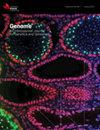Frequent numerical and structural chromosome changes in early generations of synthetic hexaploid wheat.
IF 2.3
3区 生物学
Q3 BIOTECHNOLOGY & APPLIED MICROBIOLOGY
引用次数: 0
Abstract
Modern hexaploid wheat (Triticum aestivum L.; AABBDD) evolved from a hybrid of tetraploid wheat (closely related to Triticum turgidum L. ssp. durum (Desf.) Husn., AABB) and goatgrass (Aegilops tauschii Coss., DD). Variations in chromosome structure and ploidy played important roles in wheat evolution. How these variations occurred and their role in expanding the genetic diversity in modern wheat is mostly unknown. Synthetic hexaploid wheat (SHW) can be used to investigate chromosome variation that occurs during the early generations of existence. SHW lines derived by crossing durum wheat 'Langdon' with twelve Ae. tauschii accessions were analyzed using oligonucelotide probe multiplex fluorescence in situ hybridization (FISH) to metaphase chromosomes and SNP markers. Cluster analysis based on SNP markers categorized them into three groups. Among 702 plants from the S8 and S9 generations, 415 (59.12%) carried chromosome variations involving all 21 chromosomes but with different frequencies for each chromosome and sub-genome. Total chromosome variation frequencies varied between lines, but there was no significant difference among the three groups. The non-random chromosome variations in SHW lines detected in this research may be an indication that similar variations occurred in the early stages of wheat polyploidization and played important roles in wheat evolution.合成六倍体小麦早期世代染色体数量和结构的频繁变化。
现代六倍体小麦(Triticum aestivum L.;AABBDD是由四倍体小麦(与Triticum turgidum L. ssp亲缘关系密切)杂交而来。硬质(Desf)。Husn。(AABB)和山羊草(Aegilops tauschii Coss)。DD)。染色体结构和倍性的变异在小麦的进化中起着重要的作用。这些变异是如何发生的,以及它们在扩大现代小麦遗传多样性中的作用在很大程度上仍然未知。合成六倍体小麦(SHW)可用于研究早期存在的染色体变异。由硬粒小麦'Langdon'与12 Ae杂交获得的SHW系。采用中期染色体的寡核苷酸探针多重荧光原位杂交(FISH)和SNP标记对黄鳝材料进行分析。基于SNP标记的聚类分析将其分为三组。在S8和S9代的702株植物中,415株(59.12%)携带21条染色体的染色体变异,但每个染色体和亚基因组的变异频率不同。染色体总变异频率在不同品系间存在差异,但三组间差异不显著。本研究检测到的SHW系的非随机染色体变异可能表明,类似的变异发生在小麦多倍体化的早期阶段,并在小麦的进化中发挥了重要作用。
本文章由计算机程序翻译,如有差异,请以英文原文为准。
求助全文
约1分钟内获得全文
求助全文
来源期刊

Genome
生物-生物工程与应用微生物
CiteScore
5.30
自引率
3.20%
发文量
42
审稿时长
6-12 weeks
期刊介绍:
Genome is a monthly journal, established in 1959, that publishes original research articles, reviews, mini-reviews, current opinions, and commentaries. Areas of interest include general genetics and genomics, cytogenetics, molecular and evolutionary genetics, developmental genetics, population genetics, phylogenomics, molecular identification, as well as emerging areas such as ecological, comparative, and functional genomics.
 求助内容:
求助内容: 应助结果提醒方式:
应助结果提醒方式:


